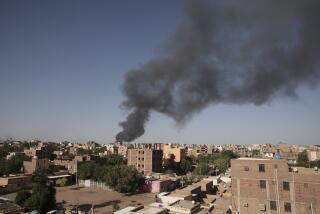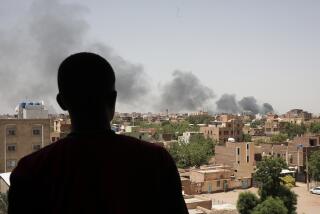Clinton Lauds U.S. Role in Somalia, Urges Leaders to Keep Order
- Share via
WASHINGTON — With the last U.S. troops packing up to leave Somalia in the next few days, President Clinton on Wednesday said that the United States did more than could be expected there, even if competing warlords soon plunge the country back into starvation and chaos.
Talking to reporters at the White House, Clinton said Somalia is now the responsibility of factional leaders whose disputes produced a man-made famine two years ago. He urged them to be more responsible.
“The responsibility is shifting back to the leaders there on the ground, and they ought to work it out,” Clinton said. “They ought to prefer the life their people have had the last . . . 15 months to what they had before.”
Although the Pentagon has made the U.S. withdrawal as gradual as possible, Gen. John M. Shalikashvili, chairman of the Joint Chiefs of Staff, said the departure of the Americans could have an adverse impact. He said there has already been a surge of banditry.
Nevertheless, both Clinton and Shalikashvili said Americans should be proud of the results of the humanitarian operation to alleviate starvation.
“Think of what it would be if we, the United States and the U.N., had not gotten involved,” Shalikashvili said. “Thousands upon thousands are alive today” because of the outside intervention.
The President observed: “The American people have been very generous with their money and with their support. We have lost some of our most precious resources--(the lives of) our young people--in Somalia because of the nature of the conflict. And I think we have done our job there and then some.”
Emphasizing his policy of avoiding most U.S. military involvement abroad, Clinton said the United States cannot be expected to intervene indefinitely in what is essentially a civil war.
“There are civil wars in a lot of countries in this world (where) we have not made anything like the effort we’ve made in Somalia,” he said. “There’s a civil war in Sudan. There’s a civil war in Angola. There were lots of people killed in Burundi.”
Clinton acknowledged that Somalia’s humanitarian crisis cannot be overcome if the country’s political situation is not addressed. He suggested that former President George Bush, who initiated U.S. involvement, may not have realized that.
“If you go back to 1992, this whole mission was billed as a humanitarian mission, and the first time President Bush spoke with me about it, he said he thought maybe they would be out before I was inaugurated or by the end of January. And what we learned from that, of course, is that--at least in the case of Somalia and many other cases--you can’t have a humanitarian mission divorced from the political problems of the time.
“The people in Somalia were starving not because there was no food that could be given to them. They were starving because of the political and military conflicts consuming the country,” he said.
Times staff writer Art Pine contributed to this report.
More to Read
Sign up for Essential California
The most important California stories and recommendations in your inbox every morning.
You may occasionally receive promotional content from the Los Angeles Times.













